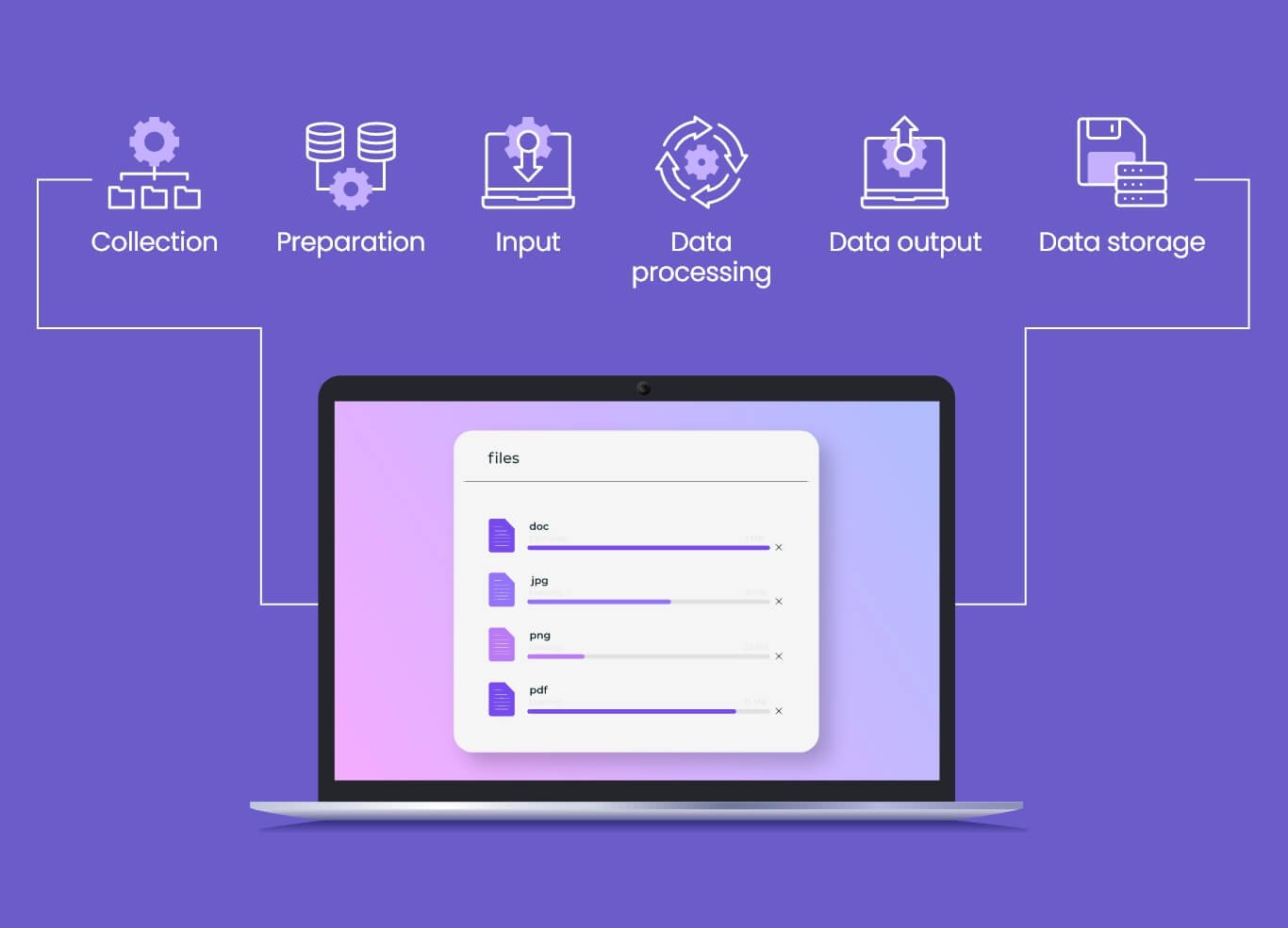Dealing with various types of forms in massive amounts is tedious, cumbersome, and a head-scratching task for any company. Forms are typically information-based data collection tools that help businesses get details. Every day, different types of forms, like invoices, legal documents, claims, and more, are processed in any organization. As said, these forms contain essential information that is valuable details for businesses and must be stored effectively to ensure retrieval and quick access. In the growing digital business landscape, managing massive amounts of online and physical forms is one of the most time-consuming and storage-occupying spaces and is also difficult to access.
Businesses from various sectors produce and collect a variety of forms containing valuable data. This data is further utilized in multiple aspects of business growth and expansion. As a matter of fact, rapid digitalization has taken over the business economy, although some organizations still continue to practice paper-based forms, which at one point becomes a daunting task to manage. Typically, businesses have new employee forms, marketing agency product questionnaires, hospitals to fill in patients’ health details, hotels for feedback forms, and many more. All these forms have a few questions in common: name, contact, and email. These are the generic details filled out by the person, and the data is extracted from the forms. However, how long a company manages the paperwork and maintains the records arises. Furthermore, analyzing data and managing it is a time-consuming and resource-intensive task.
Drive Business Growth with Accurate Form Management
Here comes the crucial role of forms processing services for companies to manage their massive forms and get the desired data. As discussed, paper-based forms are intensive, while online forms are time-consuming when extracting the details. Forms are typically the first step in a company’s data collection and facilitate other functions, which is why the ubiquitous nature of forms in the corporate realm necessitates the implementation of form processing for business.
While forms are one way of data collection, the extracted data helps in operational activities. The collection and generation of forms have played a crucial role in data extraction market growth. The global data extraction market is predicted to reach a value of $4.90B by 2027, CAGR of 11.8%. The exponential growth of the data extraction market is played by form processing, which has now become a fundamental element of fetching data and processing valuable insights for businesses. Discover in detail about what forms of processing services are and their significant impact.
Understanding Form Processing Services for Business
By nature, forms are ubiquitous in traditional and digital work processes. From filling out forms physically to online forms, businesses have always benefited from forms. Today, form processing for business has become a primary process for all types, natures, and sizes of corporations. Additionally, form processing is an invaluable technique that helps to drive insightful data from surveys, medical claims, applications, polls, and more.
Form processing is a sub-service of data processing services that involves extracting data from digital or paper-based forms. It is a process defined for capturing vital details that can be used to create a strong database for further utilization. This data can include contact details, names, addresses, dates, emails, and more. In the modern business era, organizations have multiple forms, a mix of electronic and manual forms. Form processing services involve various techniques and technologies that help convert unstructured data into structured form for better analysis and utilization.
As the corporate realm gets digitized with growing demands and rapid growth in technology, it has become a debate for companies whether manual or data processing automation is more valuable. Manual form processing involves human intervention, validation, and integration, that demands for a high degree of control. Automated form processing intake technologies like artificial intelligence and OCR methods offer streamlined processes. However, most businesses opt for data processing automation for better results, less human intervention, and optimized results.
Although businesses from various sectors generate forms according to the demand, concerns, and requirements, forms are typically categorized into three main types following are;
- Structured forms
- Semi-structured forms
- Unstructured forms
Each type of form requires specific methodologies to extract data. The collected data further becomes a beneficial resource for a company. Let’s explore some of the key benefits of form processing for business.
List of Benefits of Forms Processing Services
As discussed in the importance and definition of form processing, businesses from different sectors generate various forms that help collect basic data. Other than that, the collection of forms isn’t the only end goal; proper management, structuring, and organizing are required to ensure quick retrieval and easy access, which is why form processing services come into play. Understanding the sheer importance of the same, it also offers a variety of benefits other than data extraction. The following are key advantages that help companies to make and maintain a strong database;
Multiple Perks of Form Processing Services
Operational Efficiency and Automation
Resource Management
Scalability and Flexibility
Cost Optimization
Better Data Accessibility
Legal Adherence
- Operational efficiency and automation: An automation form processing solution reduces human efforts, speeds up data processing, and eliminates errors. This results in a significant increase in business process productivity.
- Cost optimization: Reducing human efforts or manual data entry optimizes the cost, as resources can be allocated more strategically. Besides, the cost of human resources, infrastructure, and other expenses is reduced when form processing services are implemented.
- Resource management: As costs are reduced, the proper use of resources in the company can bring efficient results. Additionally, it drives better outcomes, enhances productivity, and increases overall operational efficiency.
- Better data accessibility and searchability: The exemplary implementation of forms processing service for business allows for hands-on, organized, and structured data that eases searchability, accessibility, and retrieval from the database whenever required.
- Scalability and flexibility: Another significant benefit is the flexibility aspect. Form processing is a scalable method as it allows businesses to keep a track of bulk data stored in a digital environment without diverting the employee’s productivity, efficiency, and focus.
- Legal adherence: Data processing services help businesses avoid legal fines or related issues, as crucial and confidential data is handled according to relevant regulations.
These are some of the key benefits that help businesses structure the data fetched from various sets of forms. The data extracted is later utilized for different purposes to gain valuable insights. However, these benefits are only beneficial once key components for form processing are understood. Let’s dive into a brief understanding of key components.
Key Components of Form Processing for Business
Since forms are collected and generated in every business sector, it seems like a simple task. But in reality, understanding the critical components of form processing is necessary to reap the above-mentioned benefits. Let’s look at some of the key components of form processing services.
Form Processing Components for Businesses
Data Capture Techniques
Security Compliance
Data Integration
Data Validation and Quality Control
Data Conversion and Digital Transformation
- Data Capture Techniques: Data capture is the foremost step in the form processing method. It involves OCR for printed or written text, barcode recognition, and form-specific data extraction methods. These technologies help to extract efficient data from various types of forms.
- Data Validation and Quality Control: Further, ensuring data accuracy is one of the critical factors that demand validation checks to verify data consistency, completeness, and correctness. Moreover, quality control checks are also implemented to identify any errors. This ensures the precision of data.
- Data Conversion and Digital Transformation: Once the data is captured, the collected details must be converted into a suitable format. Other than that it must be in a compatible digital format that supports business systems. This further results in easy access and retrieved information from the database.
- Data Integration: The next step is input extracted data and with target systems such as ERP, CRM, or DMS, which results in seamless data workflow and decision-making processes.
- Security Compliance: Security is the last and critical step after integration into the business system. Data security can be achieved through encryption, access control, password protection, and other measures. Moreover, GDPR, HIPAA, and others can help avoid legal actions.
By critically following the procedure, businesses can gain valuable insights. It brings an overall efficiency impact on their performance. Since following these crucial steps is evident, it is advisable to outsource data processing services to a reliable company that can ideally offer accurate and precise results. As a matter of fact, businesses from different sectors have plenty of types of forms that can be processed accordingly. The following are the various types of forms that are processed for business.
Types of Forms Processing & Industry Application
As discussed, the key components of forms processing and why outsourcing data processing services is an advisable solution are as follows: It is also essential to be briefed about the types of forms processing before hiring a reliable partner. Companies typically collect forms according to the concern of matter or based on the sector’s nature, which is why knowing about the common types of form processing is essential. Besides this, it also acts as a form-processing guide for businesses. The following are common types of forms of processing.
- Survey form processing: Survey forms collect customer feedback on the topic. Filled forms information is gathered to make further analysis. It also involves data extraction, analysis, and reporting to gain valuable insights and precise decision making process.
- Application form processing: Application forms are crucial in various sectors, such as education, finance, government jobs, entertainment, contests, and more. This type of form typically includes verifying details and maintaining records in organized formats for future use. Application form processing services help to streamline admission operations, loan approvals, and the hiring process.
- Order form processing: Order forms are usually used in the e-commerce and retail sectors. This type of form are crucial and contains detail information which is used further. It contains order details, payment information, and updated inventory systems, which enhance order accuracy, reduce errors, and improve customer satisfaction.
- Claim form processing: For sectors like insurance, banking, and healthcare, claim form processing helps speed up claim settlements and builds customer trust and streamline the financial workflow while ensuring the best customer experience.
- Tax form processing: Tax forms are vital, complex and sensitive due to the type of information entailed. Accurate and efficient processing of such forms involves acute error checking and submission to relevant authorities.
- Registration form processing: Registration is typically done for contests, courses, membership programs, events, etc. This includes generic information about participants and attendee details such as contact, name, event details, participation information and more. Right form processing makes it simple for event managers and enhances the participant experience without any hassle.
- Medical form processing: As the name suggests, medical form processing encompasses patient records, content forms, and test results. These are sensitive details that demand acute accuracy and security.
- Legal form processing: Sectors like law generate crucial details like contracts, agreements, or affidavits. Accurate form processing services extract key information while ensuring security compliance.
These are the common types of form processing services for different corporations. However, every sector generates acute forms, and form processing for businesses becomes a crucial element. The following are some of the sectors where form processing is implemented.
- Healthcare
- Financial Services
- Government/NGOs
- Education
- Real Estate
- Banking
- Travel and Hospitality
- Ecommerce and Retail
- Logistics
Concluding Remarks
Processing a form involves accurate data extraction, management, and security compliance. Uniquesdata is a reliable and trustworthy outsourcing data processing services provider, offering reliable form processing with the latest technology and a talented team.



